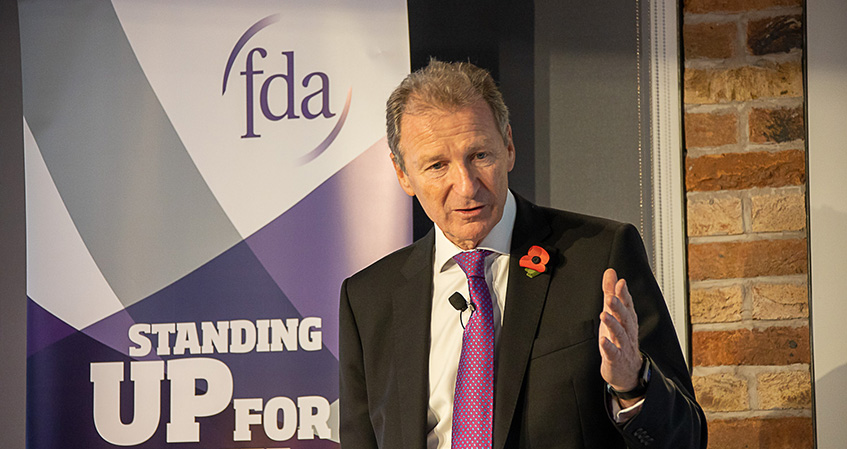Impartiality under threat – personal perspectives from Lord O’Donnell

Last night, FDA members were thrilled to be joined by former Cabinet Secretary Lord O’Donnell, who delivered an FDA centenary lecture focussing on the threats to civil service impartiality in the current political climate.
“I’m often asked whether I miss my old job at these rather exciting times,” he opened. “And the truth is the current civil service is grappling with issues that are far harder than any I had to face.”
Recognising the huge challenges facing the civil service as it prepares for the UK’s exit from the European Union, Lord O’Donnell told attendees he was “more than happy” to be speaking about impartiality and not Brexit.
Lord O’Donnell was unequivocal when explaining that the civil service is a “values-driven organisation”, with those key values being “honesty, integrity, objectivity and impartiality”. While commending the “excellent” Smith Institute report Impartiality Matters, he also stressed that impartiality “cannot survive without the other three values being held up as well”.
Using the example of rugby referee Nigel Owens, Lord O’Donnell made clear that “the job of the civil servant is to be impartial, but not neutral”, which is an important distinction. While a referee would not “take sides”, it is also “massively important that they are absolutely firm about the way the rules are conducted”. In a similar vein, while civil servants “are of course politically impartial,” they also “need to take sides on policy issues”. “Our job is to apply honesty and objectivity to come up with clear policy recommendations,” he added.
But why is this impartiality so important? According to Lord O’Donnell, there are seven key reasons:
- Impartiality allows for continuity across changes of administration.
- Impartiality is a bastion against confirmation bias.
- Impartiality builds mutual trust between civil servants and ministers, which is vital if they are to work effectively together.
- Impartiality enables the civil service to build long-terms relationships with businesses, trade unions, the monarchy, the judiciary and other institutions.
- Many civil servants operate in delivery bodies, so if their senior personnel were to change every time there’s a change of administration, it would damage their effectiveness.
- Impartiality makes the civil service a much more attractive career.
- Impartiality leads to better decisions, as it ensures ministers are surrounded with people who are not necessarily yes men and women.

He went on to raise concerns around how “the degree of impartiality is falling back somewhat” across all the civil services that feature in the rankings. Lord O’Donnell also claimed recruiting the best talent into the UK civil service “is not helped by the atmosphere we’ve got at the minute of ministers blaming civil servants for their own mistakes”, echoing the FDA’s calls for ministers to stop attacking civil servants.
However, when asked if civil service impartiality would survive, he offered an optimistic take: “It will survive for the simple reason it is a much more effective way of governing.”
Looking forward to the forthcoming election, Lord O’Donnell concluded that “whatever the shape of the new government, they can rely on a civil service that is impartial, honest, objective and has integrity to deliver its programme”.
Related News
-

Changing the culture
HM Chief Inspector Sir Martyn Oliver sat down for an ‘in conversation’ event with FDA General Secretary Dave Penman, discussing the pace of change in Ofsted, challenging perceptions and tackling the long hours culture in Education.
-

FDA attends TUC Young Workers’ 2025
This March, an FDA delegation attended the annual TUC Young Workers’ Conference in Congress House, London.
-

FDA celebrates Women’s History Month 2025 with panel event
To celebrate Women’s History Month and International Women’s Day 2025 the FDA hosted a panel event looking at the history of women in the civil service and within the trade union movement.